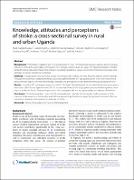| dc.contributor.author | Kaddumukasa, Mark | |
| dc.contributor.author | Kayima, James | |
| dc.contributor.author | Kaddumukasa, N. Martin | |
| dc.contributor.author | Ddumba, Edward | |
| dc.contributor.author | Mugenyi, Levi | |
| dc.contributor.author | Pundik, Svetlana | |
| dc.contributor.author | Furlan, J. Anthony | |
| dc.contributor.author | Sajatovic, Martha | |
| dc.contributor.author | Katabira, Elly | |
| dc.date.accessioned | 2021-04-30T08:14:55Z | |
| dc.date.available | 2021-04-30T08:14:55Z | |
| dc.date.issued | 2015-12-26 | |
| dc.identifier.citation | Kaddumukasa, M., Kayima, J., Kaddumukasa, M.N., Ddumba, E., Mugenyi, L., Pundik, S., Furlan, A.J., Sajatovic, M. and Katabira, E., 2015. Knowledge, attitudes and perceptions of stroke: a cross-sectional survey in rural and urban Uganda. BMC research notes, 8(1), pp.1-7. | en_US |
| dc.identifier.issn | 1756-0500 | |
| dc.identifier.uri | http://hdl.handle.net/20.500.12280/2802 | |
| dc.description.abstract | Background: Information regarding the increasing burden of non-communicable diseases such as stroke is largely unknown among the vulnerable communities. This analysis, which is part of a larger U.S. National Institute of Heath funded Medical Education Partnership Initiative neurological disorder survey, assessed community knowledge and attitudes on stroke and stroke risk factors.
Methods: A population cross-sectional survey was conducted in urban and rural Mukono, district, central Uganda. Through the systematic sampling method, data were gathered from 377 adult participants who were interviewed about selected aspects of stroke knowledge, attitudes and perception using a pretested structured questionnaire.
Results: A total of 377 participants were enrolled (47 % urban). The leading risk factors identified by the participants were stress (36.6 %) and hypertension (28.9 %) respectively. None of the study participants identified cigarette smoking as a stroke risk factor. Seventy six percent of the participants did not recognize stroke as a disease of the brain.
Conclusion: Stroke knowledge is poor in both rural and urban Uganda. Tailored public health approaches that improve stroke awareness, knowledge and self management approaches are urgently needed to develop effective preventive measures and community response to stroke | en_US |
| dc.language.iso | en | en_US |
| dc.publisher | SPRINGERNATURE , CAMPUS, 4 CRINAN ST, LONDON, ENGLAND, N1 9XW | en_US |
| dc.relation.ispartofseries | BMC research notes;8(1) | |
| dc.subject | Stroke | en_US |
| dc.subject | Knowledge | en_US |
| dc.subject | Risk factors | en_US |
| dc.subject | Warning factors | en_US |
| dc.title | Knowledge, Attitudes and Perceptions of Stroke: A Cross-Sectional Survey in Rural and Urban Uganda | en_US |
| dc.type | Article | en_US |


